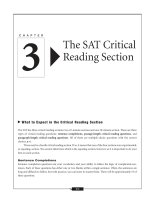Learning express Acing The Gre_About the GRE General Test
Bạn đang xem bản rút gọn của tài liệu. Xem và tải ngay bản đầy đủ của tài liệu tại đây (241.06 KB, 2 trang )
1. Q: Who takes the GRE General Test?
A. Most applicants to graduate programs take
the GRE General Test.
2. Q: What is on the GRE General Test?
A: There are three sections: Analytical Writing,
Verbal, and Quantitative.
3. Q: When is the GRE General Test offered?
A: The test is offered year-round.
4. Q:Where can I take the GRE General Test?
A: The exam is offered at testing centers
throughout the United States and the world.
5. Q:Why do I have to take the GRE General Test?
A: Graduate programs require you to take the
GRE General Test to assess your logical and
critical reasoning skills.
CHAPTER
About the GRE
General Test
1
1
The Five Ws of the GRE General Test
Team-LRN
Why the GRE General Test?
Before you went to college, you may have taken the SAT or another college admissions test. Those exams are
designed to help colleges determine whether prospective students can do the type and level of work they will
encounter in postsecondary school. The Graduate Record Exam, or GRE, like the SAT, is designed by Edu-
cational Testing Service
®
(ETS
®
), and if you took the SAT, the basic format of the GRE will seem familiar.
Instead of testing college-level skills as the SAT does, the GRE assesses abilities required for success in grad-
uate school—the ability to understand and convey ideas using language and the ability to apply basic math
concepts to solve problems and analyze data. This is why many graduate programs want prospective students
to take the exam. They want you to show that you can correctly analyze complex material, think logically, and
clearly communicate your thoughts in written form.
Who Takes the GRE General Test?
Just as most colleges require prospective students to submit standardized test scores, many graduate programs
want to see GRE results as well. If you are applying to a master’s or doctoral program, you may need to take
the exam. Of course, test results are only part of the information that schools use to make admissions deci-
sions. Factors such as grades, recommendations, and professional experience are also considered. Universi-
ties know that some students who struggle with standardized tests perform very well in their graduate course
work and vice versa. Still, the GRE is a crucial part of the admission process and one on which you naturally
want to perform well.
Maybe you are thinking, “But I’m not applying to study English, and I don’t plan to use math in my
work; why do I have to take this kind of test?” Still, no matter what field of study you plan to undertake in
graduate school, you must be able to think clearly and logically and to express your thoughts in writing. You
must be able to read and comprehend complex, densely written works, because that is the sort of material
you will encounter in graduate school. And, you must be comfortable manipulating numbers and using them
to represent concrete objects or abstract ideas. For example, if you want to attain a master’s degree in urban
planning, you may need to perform tasks such as statistical analysis of traffic flow and projections of popu-
lation trends. Social workers need to use demographic numbers regarding the needs of underserved groups.
Even aspiring filmmakers must confidently manipulate budget numbers. Just as college-level studies were a
step up from the kind of work you did in high school, graduate school requires you to think in even more
sophisticated ways. That is why graduate programs ask you to take the GRE.
When Is the GRE General Test Offered?
In the United States and in most countries of the world, the GRE is now administered as a computer-based
test (CBT), also called a computer-adaptive test (CAT).You make an appointment to go to a testing center, where
you take the exam. You may either choose a center from the list in the GRE Registration Bulletin, or ETS will
assign you to the nearest location. The exam is offered during the first three weeks of every month, year-round.
You may want to avoid the November-through-January test-taking season when most exam takers sign
up for testing. It is the busiest time of year for the test centers. However, if that is when you need to take the
exam, sign up as early as possible to make sure you get the date and time you want. Remember, you want to
–
ABOUT THE GRE GENERAL TEST
–
2
Team-LRN









